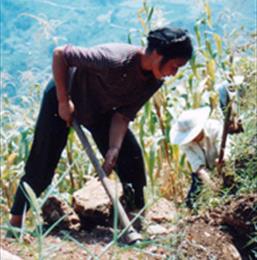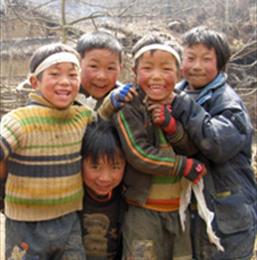Huodi Village, Hanyuan 1999-2005
Nimei Yi Minority Township
Nimei is one of the poorest and most remote townships in Hanyuan County. The vehicle road was only constructed in the early 1990s, and the journey is still four hours from the county town. The township, located at high altitude, is frequently cut off by snow, and freezing fog, and poor road conditions make this journey particularly perilous. There are three particularly poor villages in the Township, Hengshan, Huodi and Wanfu. As the township is so remote, DORS volunteers stay for several days each visit, relying on the township women’s cadre Shen Zhen to implement DORS projects between visits. Several projects are progressing simultaneously in the three villages.
Only one season of crops is grown. Remoteness from market and the difficult and expensive transportation conditions make other options for income-generating crops unsuitable, even if they grow well in the region, for example fruit.
Hengshan VillageWater Supply Project
Hengshan is a village of five hamlets, with a population of 343 in 77 households. The hamlets are between one and three hours' walk from the township seat. The population has reduced in recent years as people have moved away. Hamlets two and three have electricity, the others do not. All hamlets had severe drinking water shortages in 1999.
Crops grown are maize, potatoes (swapped for rice), white beans, and buckwheat. Land is relatively plentiful by the standards of this intensively farmed county, as some families have abandoned their holdings and moved away. However, the sloping fields are often far from the village houses, the costs of inputs are high due to additional transport costs, and the relatively short growing season hinders agricultural production. Some households also raise goats and sheep.
The Water Conservancy Bureau were providing material for a water supply project in Hengshan, but the villagers were being asked to provide half the cost of the materials themselves. As they couldn't afford this, the project had not gone ahead. DORS agreed to provide the villagers' contribution and a contract was signed in February 2000.
Other projects in the village are Social and Community Forestry and Women’s Training
Huodi Village
Huodi is a village of Yi people, with a population of 268 in 57 households. It is a poor village of five hamlets reaching up the hillside away from the road to the township. Hamlets one to four were connected to the electricity supply in late 1999. There is no village school and only a handful of the village children can attend the primary school in the township, a two-hour walk away. Most of the population is illiterate.
Cash crops of Sichuan Pepper (huajiao) and white beans are grown. Staple crops are maize, potatoes, and buckwheat. Potatoes are swapped for rice with traders who come up in trucks, at a rate of 6:1 in the trader's favour. Crop failures are frequent.
Some livestock are kept such as cattle, sheep, goats, and pigs.
Other projects in the village are Social and Community Forestry and Women’s Training
Wanfu Village
One of the hamlets of Wanfu Village lies on the road and other four are spread out down the steep hillside into the valley bottom below. Hamlet five (by the road) is inhabited by Yi people, who dress in their traditional embroidered clothes and felt capes. The other hamlets are populated by Han people. The hillside on which this village is perched is so steep that villagers have lost their footing and fallen to their deaths. The hillside land is mostly too steep for growing crops, but there are fields in the river valley.
In the village there are 58 households and a population of 207. The village has a school in the valley bottom.
There is one hydro-power installation supplying one household, the remainder have no electricity.
Agricultural produce for exchange such as potatoes must be carried up the hillside to the road to await traders. The village has some walnut trees, and walnuts along with white beans are their main cash crops. Adverse weather conditions frequently affect their crop production and income.
Other projects in the village are Social and Community Forestry and Women’s Training
Nimei Township Social and Community Forestry
DORS’ interdisciplinary rural development team visited the township of Nimei, the township officials and the local party secretary were initially interviewed on the subject of developmental projects and the role that DORS would take was discussed. The township had devised a rather grandiose agroforestry scheme incorporating walnut and chestnut trees in one mu (0.066 ha) of each households agricultural land within the three registered poor villages Hengshan, Huodi and Wanfu – total population being 933.
Household interviews in all hamlets were then carried out in the villages of Hengshan, Huodi and Wanfu over the next five days. It was found that forestry was an area of great interest, but the villages felt that the townships' plan would be a risk due to the size, the amount of agricultural land sacrificed and the lack of experience in growing the species choice.
Therefore, the villages asked for smaller amounts of economic trees – walnut and chestnut – to be supplied, in order that some experimental planting could be done. However the need for fuelwood and timber trees was identified, and alder and conifer saplings were supplied to meet the needs of the households.
Additionally, the villagers held a meeting with DORS’ to explain that there is considerable interest in the setting up of nurseries, it was agreed that DORS would find relevant nurseries for the villagers to visit and give appropriate training in nursery and forestry management.


